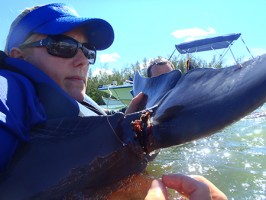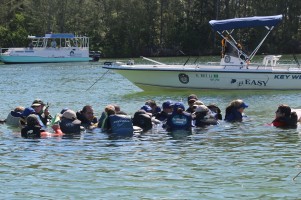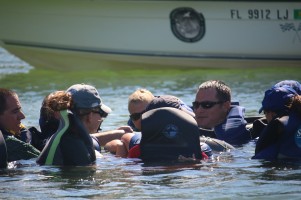Team Saves Dolphin Calf From Fishing Gear Entanglement
Today, an 11-month-old female bottlenose dolphin calf is swimming free and clear of fishing gear that could have severed her tail after 10 groups — including Mote Marine Laboratory — mounted a life-saving rescue in Little Marco Pass in Collier County.
The dolphin, a dependent calf nicknamed Skipper, was first spotted by members of the 10,000 Islands Dolphin Project, who documented the entanglement and reported it to state and federal authorities in August. After the dolphin was spotted several times over several weeks still entangled in fishing gear, NOAA’s National Marine Fisheries Service (NMFS) — which oversees the protection of marine mammals in the U.S. — asked the Sarasota Dolphin Research Program (SDRP), a partnership between Mote Marine Laboratory and the Chicago Zoological Society, to try to free the dolphin of the gear.
An initial effort by SDRP and Mote to remove the gear with a long-handled disentanglement tool on Aug. 28 was not successful.
NMFS and SDRP contacted members of the Southeast Regional Marine Mammal Stranding Network to help with a rescue. The team included Florida’s Fish and Wildlife Conservation Commission (FWC) and FWC Law Enforcement, NMFS, the Chicago Zoological Society, Mote Marine Laboratory, Sea World, Clearwater Marine Aquarium, University of Florida, the Rookery Bay National Estuarine Research Reserve and 10,000 Islands Dolphin Project.
Early on Thursday, Sept. 4, 2014, a team of 39 people and six boats gathered at the Collier Boulevard boat ramp near Marco Island. Members of the 10,000 Islands Dolphin Project and a team from Clearwater Marine Aquarium had already been on the water looking for the calf and her mother, Halfway, and had found them.
The SDRP orchestrated the rescue: One boat set a net to encircle the dolphins, then the net corral was moved to shallower water and team members got into the water around the net and briefly restrained the animals. In the water, veterinarians found that about a foot of metal fishing leader, probably from a trolling rig, was wrapped around the base of Skipper’s tail peduncle and flukes. Left unchecked, the stiff metal wire would have cut deeper into the dolphin and eventually severed her tail.
“We are seeing situations like this all too often along Florida’s coasts,” said Dr. Randy Wells, director of the Sarasota Dolphin Research Program and the rescue’s coordinator. “This otherwise healthy dolphin calf likely would have died had we not been able to remove the gear. Her entanglement is a prime example of why we humans need to be careful with our fishing gear and watch out for wildlife that lives in our coastal waters.”
This year alone, Mote’s Stranding Investigations Program and animal hospitals have responded to more than 80 stranded sea turtles and 40 stranded marine mammals within Sarasota and Manatee counties and throughout the wider region covered by the Stranding Network.
Skipper is the 22nd live animal that Mote has helped to rescue this year, said Gretchen Lovewell, manager of Mote’s Stranding Investigations Program. The team also recently helped to rescue “Speedy,” a dolphin that was trapped in a lake in the Everglades in July. In addition to responding to stranded dolphins and sea turtles, Mote’s team also supports FWC’s response to stranded manatees in Southwest Florida.
“This rescue was really rewarding,” Lovewell said. “Not only was it a demonstration of how well the Stranding Network comes together to respond to animals in distress, but it was also an opportunity to give this individual dolphin a better chance at survival and to show what can be accomplished when all of us work together.”
The rescue was possible thanks in-part to grants from the NOAA Fisheries John H. Prescott Marine Mammal Rescue Assistance Grant Program. This federal program supports the costs for teams to help dolphins and whales — like Skipper — that face life-threatening situations.
“This was a great team effort for a successful dolphin calf disentanglement,” said Denise Boyd, FWC Research Associate who coordinates stranding responses in Charlotte, Lee and Collier counties. “We hope that the dolphin will go on to lead a healthy life from here on in.”
To Help
Rescuing stranded marine mammals takes a group effort — from members of the public who report sick or injured animals and the management agencies that authorize such rescues to take place to the “boots-on-the-ground” teams at nonprofit institutions and organizations that conduct many such rescues. Nonprofit organizations rely on public donations to fund such work. Please consider making a donation to Mote Marine Laboratory or another participating agency to help. Donate online at https://mote.org/support/donate.



